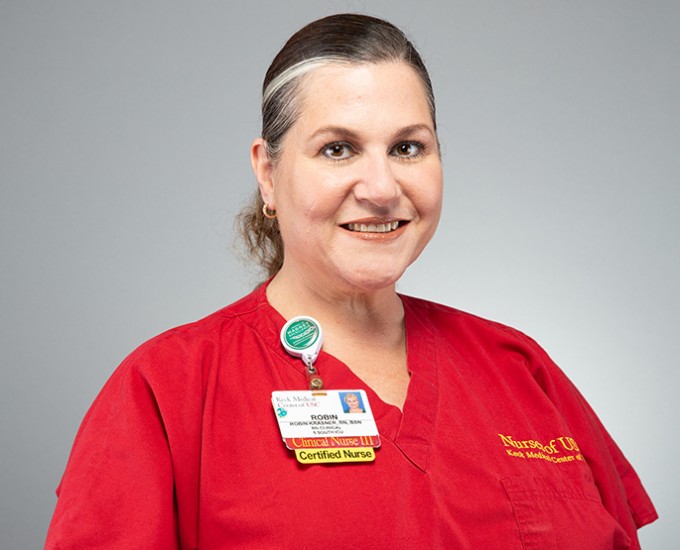My Specialty
Clinical Improvement, Robin Krasner, Keck Medical Center of USC
Evaluating processes to improve care delivery

Robin Krasner, RN, BSN, CCRN
Clinical Improvement Fellowship and Critical Care Nurse
Keck Medical Center of USC, Los Angeles
Tell us about your nursing career.
My mother lost a battle with breast cancer at age 46. I had basically lived with her in the hospital for two months to serve as her advocate, so my aunt urged me to consider becoming a nurse.
My first nursing job was at a Veterans Administration hospital. After two years, I became a charge nurse, took a critical care training course and went on to work in cardiac critical care. I worked at a critical care medical ICU at a VA facility in Connecticut for 16 years. I also did various travel assignments, became a rapid response nurse at a Planetree facility and worked in general ICU in Texas for a few years.
My husband is from the Dominican Republic, so I also worked for a time as a consultant for a hospital in Santo Domingo, helping them prepare for Joint Commission International accreditation. It was a wonderful and challenging experience, since even the most basic things were not really standardized.
What is your current role at Keck Medical Center of USC?
Our Value Improvement Office started the clinical improvement fellowship in 2017. It’s an opportunity for a clinician to engage with administration in a unique way to bridge the gap between hospital leaders and frontline providers. It sounded very interesting, so I dove into the role in July 2018.
I spend two-thirds of my time as a clinical improvement fellow while maintaining one clinical shift per week. This allows me to continue engaging in direct patient care, maintain my clinical skills and bring what I’m learning back to my colleagues at the bedside.
I work mostly in the Care Delivery Redesign (CDR) pod. When I first started, it was all new to me. I didn’t know much about the business of healthcare, data transparency or the strategy and planning behind creating improvement and change, so it was challenging at the beginning.
Based on my clinical expertise and interests, I joined the Enhanced Recovery After Surgery (ERAS) project. Our seven-person, interprofessional ERAS team works to standardize care for surgical patients across clinical pathways, including pre-habilitation, optimal pre-surgery nutrition, multi-modal pain management, early mobilization and minimizing tubes and wires.












